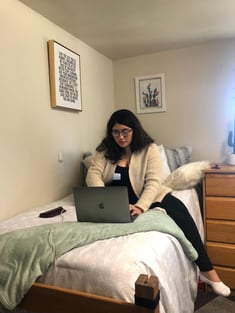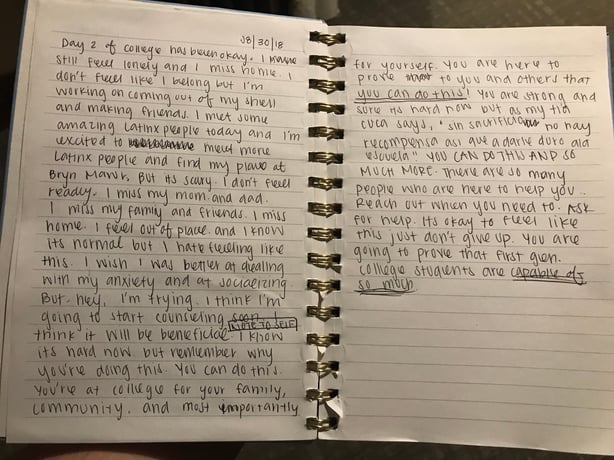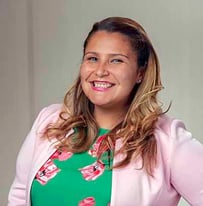
By Irene Castillon
I still vividly remember receiving the letter:
Dear Irene:
I hope that you are as pleased to receive this decision notification as I am to provide it. You have been admitted to the 241st class to enter The College of Brown University . . .
My hands trembled as I held the acceptance letter, the words turning into blurry blobs as tears of joy and pride welled up in my eyes.
But, shortly after the news of my acceptance circulated among my teachers, I learned some teachers were labeling me as the “exception to the rule.” To them, an English-learner, low-income Latina would be incapable and would not belong at Brown University, Stanford University, or San Jose State (which are now my alma maters).
 Despite knowing these stereotypes are still pervasive in some schools, I also know there are schools led by innovative educators who believe in the potential of all students. Four years ago, I had the opportunity to become the founding academic dean and Mexican-American history teacher of Luis Valdez Leadership Academy (LVLA). As a school, we built structures and programs that would affirm students from all backgrounds and foster their potential by placing and supporting culturally competent and well-prepared teachers in front of them. In our inclusive and loving community, families, community members, students, and teachers work collaboratively toward a goal of making college accessible to first-generation college students.
Despite knowing these stereotypes are still pervasive in some schools, I also know there are schools led by innovative educators who believe in the potential of all students. Four years ago, I had the opportunity to become the founding academic dean and Mexican-American history teacher of Luis Valdez Leadership Academy (LVLA). As a school, we built structures and programs that would affirm students from all backgrounds and foster their potential by placing and supporting culturally competent and well-prepared teachers in front of them. In our inclusive and loving community, families, community members, students, and teachers work collaboratively toward a goal of making college accessible to first-generation college students.
Luis Valdez Leadership Academy was built to challenge the status quo and disrupt the cycle of inequitable education I experienced. For me, being part of a historically inequitable education system that structures opportunities for people of color meant my value and my worth were reduced to narrow parameters embodied in meritocratic constructs like the achievement gap. You might be thinking, “Look at you, you did just fine and now a you’re Heinemann Fellow!” However, while I would like to say it was easy to persist and survive institutions that were not designed with my interests in mind, it was not.
My confidence as a student was shaken when I started my educational journey at Brown. My freshman year I received my first anthropology grade, and instead of seeing the A I was used to getting in high school, I received a typed letter from the professor about why my paper did not receive a passing grade (at least he told me why I failed, which was nice, but it didn’t take away the sting of the F). I remember calling my mom after I received that graded paper. I walked from the class to my dorm with the intention of telling her how I worked on this paper for weeks and how my white, private school–educated roommate worked on it for a day and got an A! How I felt like a failure and how, maybe, Brown was not a place for me.

However, when she picked up the phone, the familiar utterance of “hola Irene, como estas mija?’’ was enough for me to swallow the frog in my throat. Instead, I told her about how the leaves on the main green were changing colors and that she would love it because fall is her favorite season. I never told my mom my insecurities and my internalized feeling of inferiority. I never told her about the many times I wanted to pack my bags and go home.
With all its pain and accompanying tears, it is this struggle that is part of my story. It is this struggle that led me to my passion: education. It is this struggle that feeds the responsibility and obligation I carry as an educational leader: a responsibility to create equitable access to college.
• • •
Latinxs resist and defy the negative stereotypes placed on communities of color; we challenge the inequity in our society. We are biliterate, which enables us to traverse and navigate spaces for ourselves and for our families, to persist and to share cultura. We are aspirational and we want the best for ourselves, our families, our communities, our society. Yet, we are underrepresented in colleges and universities. In 2017, Georgetown University’s Center on Education and the Workforce released a report, Latino Education and Economic Progress: Running Faster but Still Behind, highlighting that while Latinx students are graduating high school and initially enrolling in colleges at higher rates, white students graduate from college at a higher rate than Latinx students. “Forty-three percent of Whites complete their bachelor’s degree within six years, compared to 21 percent of Latinos” (Carnevale and Fasules 2017). The graduation rates and college enrollment rates of Luis Valdez Leadership Academy’s founding class echo these findings; of the 94 students who graduated in 2018, 100 percent graduated from high school and enrolled at a college. It is my hope that through my research, the students of LVLA will increase the percentage of Latinos graduating from college.
At LVLA, the goal is for students to not only get into college but graduate from college, because they deserve to and are capable. This is why when their acceptance letters came in, my students’ eyes welled up with tears, the way mine once did as I held my Brown acceptance (okay, I also cried tears of joy with them in these instances). Their acceptance meant they were one step closer to achieving their goal.
But what about the hidden tears that I cried during college? Will these be part of my students’ experiences too? The tears of frustration not only after receiving failing papers but also after experiencing microaggressions or after being called a “wetback” outside a Massachusetts Walmart. Are my babies going to experience this? And, if so, what can we, their LVLA familia, do to prepare them?
• • •
My research as a Heinemann Fellow will explore the following question:
In what ways can a high school community support their first-generation, Latinx college students as they navigate their first year at a four-year-college setting? Our goal is to get students not only to college but through college.
My plan is to examine their first-year experience, to shed light on their needs, and, ultimately, to use what I’ve learned to continue to support them in their second year and to better prepare every student of LVLA before, during, and after the transition to college.
For me, a driving force each time I enter the classroom is the thought that my Latinx students will one day be at places like Brown, Stanford, and San Jose State. My work is to remind them that even if it makes others uncomfortable, they are capable of sitting in a college classroom and they deserve to be in that classroom. Through this work, I hope to identify exactly what they need from us, their high school, their family, to navigate predominantly white college institutions. In four years, I plan on sitting at their college graduations and crying triumphant tears along with them and their families.
• • •
Works Cited
Carnevale, Anthony P., and Megan L. Fasules. 2017. Latino Education and Economic Progress: Running Faster but Still Behind.
Accessed 10/5/2018 from
https://cew.georgetown.edu/cew-reports/latinosworkforce/#full-Report.

Irene Castillón (San Jose, CA) is the founding academic dean at Luis Valdez Leadership Academy in San Jose, CA, where she seeks to build structures and programs that affirm students by fostering teaching and learning that is culturally competent and empowering. Irene was also the recipient of the Phyllis Henry Lindstrom Educational Leadership Award and in 2016 and was recognized by the U.S. Department of Education as part of the #LatinosTeach campaign. With her leadership and teaching largely influenced by her own experiences, Irene entered education to advocate for equity, tolerance and justice.


